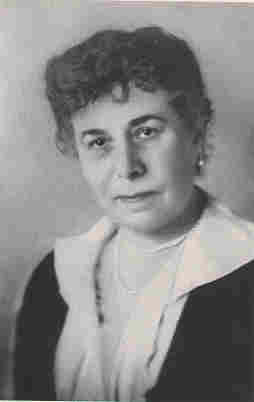- Profession: Actress, impresario
- Relation to Mahler: Mentioned by Natalie Bauer in her recollections. Left a diary, letters, and many personal memories.
- Correspondence with Mahler:
- Born: 00-00-1855 Born Louise Schwarz
- Married: Hermann Wolff (1845-1902).
- Died: 25-06-1935 Berlin
- Buried: 00-00-0000
After Hermann Wolff‘s death, his widow Louise took charge of the concert agency, and she was soon popularly known as “Königin Louise” (in allusion to the beloved Queen of Prussia during the Napoleonic Wars) because of the way she dominated music life in Berlin. She continued her husband’s close collaboration with Nikisch and the Philharmonic Orchestra, as well as inviting many foreign artists, including Rachmaninoff and Chaliapin, to perform in Berlin. When her loyal assistant Hermann Fernow died in 1917, Louise had to look for a new associate and eventually chose Erich Sachs, the owner of a smaller concert agency. A merger took place, and the firm was now known as the “Concert Direction Wolff & Sachs”, although Louise continued to exercise sole responsibility for the Berlin Philharmonic’s concerts. After Nikisch’s death in 1923, she established a good relationship with his young successor, Wilhelm Furtwängler, with whom she jointly drew up the orchestra’s programs. One highlight of Louise’s last years was her organization of Yehudi Menuhin’s triumphant début in Berlin on 12 April 1929, a few days before the boy’s thirteenth birthday.
Very soon after Hitler came to power in January 1933 it became clear that the days of the concert agency founded by Hermann Wolff were numbered. Thus, the Nazi government prohibited Bruno Walter from conducting a scheduled concert with the Berlin Philharmonic. Shortly afterward, Louise’s associate Erich Sachs emigrated from Germany, and the firm again came to be known by the old name of Concert Direction Hermann Wolff. But already by the end of 1934, Louise had decided to dissolve the agency, since she realized that her daughters, Edith and Lili, on account of their Jewish ancestry, would not be allowed to carry on their work for the family firm undisturbed. When she announced her decision in April 1935 many famous musicians wrote to Louise to express their sadness over the loss of this institution. A few weeks later, on 25 June 1935, Louise herself died.
Edith and Lili still remained proprietors of the Bechstein Hall built by their father, but the Nazis forced them to remove the busts of Anton Rubinstein and Josef Joachim from the foyer (they had been erected there by Hermann Wolff alongside those of Bülow and Brahms, to commemorate the four great musicians who inaugurated the concert-hall in 1892). Detectives sent by the Reichsmusikkammer ransacked the offices of Edith and Lili in 1936 and carried away many valuable documents (letters, autographs, program notes) in which the whole fruitful history of the Concert Direction Hermann Wolff was reflected. In 1942, Edith was interned in the concentration camp of Theresienstadt (Terezín), but, unlike some of her friends who were later deported to Auschwitz, she survived the war.
In 1954, Edith published a very interesting book – Wegbereiter großer Musiker (Path-breakers for Great Musicians) – in which she gave an account of the activities of her father’s concert agency, replete with lively anecdotes about the composers and musicians whom her parents had worked with.
3 letters from Tchaikovsky to Hermann Wolff have survived, dating from 1889 and 1891:
- Letter 3754a – 5/17-01-1889, from Frolovskoye
- Letter 3785 – 5/17-02-1889, from Dresden
- Letter 4381a – 6/18-05-1891, from Philadelphia
39 letters from Hermann Wolff to Tchaikovsky, dating from 1887 to 1891, are preserved in the Klin House-Museum Archive.



